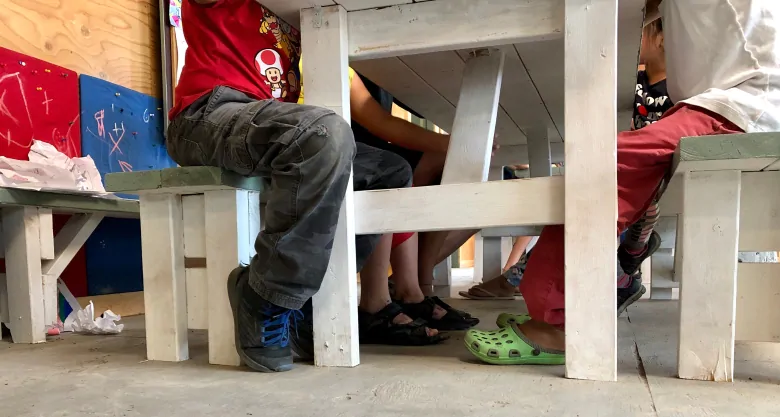'We're not getting the support we need': N.W.T. foster care employees speak out

Child protection workers in the Northwest Territories say they’re overworked and not getting the support they need as they’re facing fierce criticism from foster families.
Some staff with the territory’s Child and Family Services division spoke with CBC after a scathing letter from the Foster Family Coalition of the Northwest Territories was made public earlier this month. It outlines 49 grievances including allegations that front-line workers withheld information, lied to and verbally abused foster parents.
CBC contacted 32 employees within the division. The N.W.T.’s Department of Health and Social Services recently sent an email to employees discouraging them from speaking directly to the media. Many employees did not respond or declined to comment.
Several foster families also shared horror stories with CBC claiming negligence and unsafe practices within the system.
CBC agreed to protect the identity of the staff who expressed fears they could lose their jobs.
Not surprised by allegations: employee
One front-line worker told CBC they weren’t surprised by the allegations from the coalition.
“I’ve seen it with my own eyes,” they said.
That includes claims that some workers have misled foster parents about the length of placements.
I feel like I need to protect my foster parents from the system.– Child and family services front-line worker
The worker said there’s pressure to find placements for children quickly and claimed there’s a lack of repercussions if they don’t complete paperwork on a child’s placement information. But the worker said they try to give foster families as much information as possible, as taking a child into care is a “huge decision.”
“I feel like I need to protect my foster parents from the system.”
Many of the issues, the front-line worker said, stem from workers not getting adequate support.
“Social workers in the N.W.T. are just feeling so beat up,” they said. “And I’m not saying that it’s not deserved, a lot of it is well-deserved … but we’re not getting enough support that we need.”
Managers and supervisors often aren’t available to front-line workers, they said. Under the division’s standards and procedures, a supervisor’s approval is needed to proceed with investigations, apprehension orders, and service agreements, among other duties.
“Our work is very time sensitive. If you can’t reach a supervisor, then that holds up your work,” the worker said.
The worker said there’s a need for more educated front-line workers in the territory, but that’s a challenge.
To do really good work we might need to triple our team in some offices.– Child and family services employee
“We can’t attract workers anymore, people are leaving en masse.”
Despite the challenges, they said they love their job.
“This is not for the faint of heart and it’s not a job — it’s a vocation.”
Understaffed and overburdened
Another employee with child and family services said they also weren’t shocked by most of the allegations from the foster family coalition and agreed foster families aren’t being adequately supported.
- Do you have a story to share? Contact hilary.bird@cbc.ca
“I think it’s hard if they’re not being valued or validated as much as they probably should be.”
However, the employee said they were surprised by claims that foster parents were verbally abused and said they didn’t believe anyone intentionally withheld information. They said child protection workers often have limited information when children are apprehended in an emergency.

The employee confirmed that front-line workers face challenges getting in touch with supervisors. They pointed to heavy workloads and understaffing as the biggest challenges facing the division.
“In the last couple of years … we’ve had trouble keeping up with emergency situations, let alone situations that weren’t [an] emergency.”
I’m a mother and I just, I was really hurt and upset that this continues to happen.– Diane Thom, N.W.T. minister of health and social services
They said the division needs double the staff to keep up with basic job necessities.
“To do really good work we might need to triple our team in some offices,” they added.
Both child and family services employees agreed that these gaps mean children in care aren’t getting the services they need.
“They’re getting the bare minimum,” the employee said.
‘I was really sad,’ says health minister
The 2018 auditor general’s report says while the Department of Health and Social Services introduced ambitious new changes following the 2014 audit, they were undermined by a lack of adequate training, support and direction for employees.
The territorial government agreed to many of the report’s recommendations — including providing standardized support for foster families, training and support for staff, and assessing workload capacity, funding and staffing needed to deliver services.
The department has said they’ve completed about 33 per cent of the plan, including staff training, an initial caseload analysis, and adding 21 new positions.
In the first interview with CBC since the coalition’s letter was made public on Jan. 17, Minister of Health and Social Services Diane Thom repeatedly referenced the government’s “quality improvement plan.”
“There’s a lot of work to do,” Thom said on Thursday. “I’ve directed the staff, the department to make sure this is a priority.”
Thom noted the action plan is long-term, but said her department needs to “start working and [take] action.”
Despite initially responding to the foster family coalition’s letter with a generic email, Thom said she has directed the department to take their recommendations seriously, noting they make “some really strong allegations.”
“I was really sad to hear that all this is happening and, you know, I’m a mother and I just, I was really hurt and upset that this continues to happen,” Thom said.
Thom said she is meeting with the coalition on Jan. 30.





